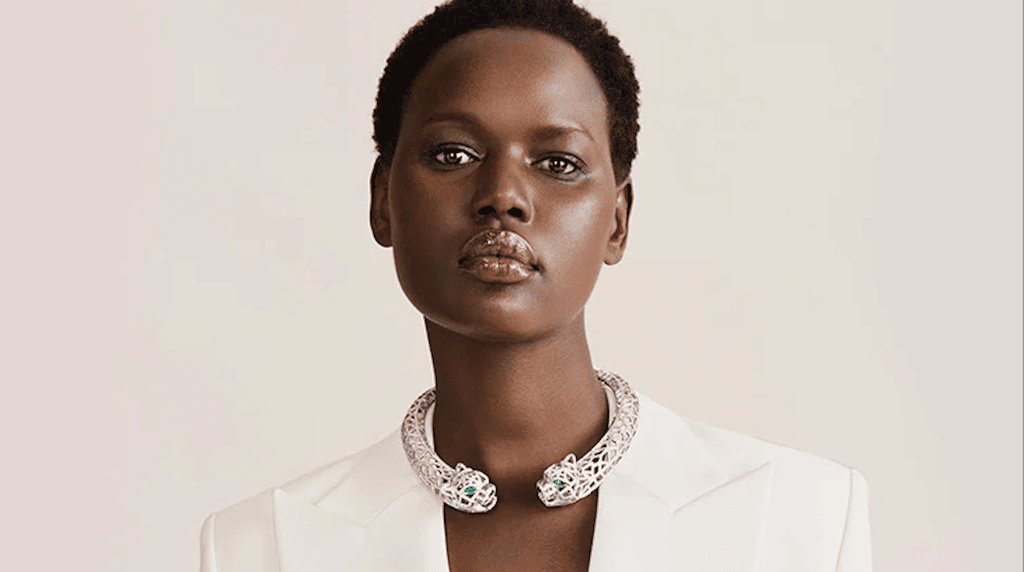Richemont’s Chloé and Cartier up their sustainability efforts as the luxury leaders turn the focus to traceability.
Chloé Vertical, the traceability project announced by the Richemont label late last year, is now making its debut in the label’s SS23 collection. It brings digital IDs to garments, bags, and shoes, that allow users to explore traceability options including product and material information, as well as information on repairs and resale options, which Chloé says is an industry first.
Chloé Vertical
The tech is expected to come to all of Chloé’s products by 2025, building on its ethics and sustainability efforts; in 2021, Chloé became the first luxury label to earn B Corp status.
“I’m delighted to be enabling Chloé customers around the world the opportunity to make informed decisions about the transparency, traceability, and circularity of our products,” Riccardo Bellini, Chloé president and CEO, said in a statement.

Secondhand platform Vestiaire Collective will facilitate the Chloé Vertical ‘Instant Resale’ platform. Once sellers upload their product images and details, Vestiaire Collective will make an offer on the items.
While the resale option may be an industry first, digital IDs have been used across a number of fashion labels including Ralph Lauren, Levi’s, and Chloé creative director Gabriela Hearst’s own eponymous label.
Chloé’s digital IDs come by way of a partnership with Eon — a fellow participant in the King Charles III-led Sustainable Markets Initiative.
“The Digital Passport’s ultimate objective is to empower customers to make informed sustainable purchase choices as they increasingly demand disclosure, transparency and traceability,” Federico Marchetti, chairman of The Sustainable Markets Initiative’s Fashion Task Force, said in a statement. “Chloé is taking another huge step forward with its implementation. Gabriela Hearst and Riccardo Bellini have always been one step ahead in looking to the future and combining technology with a genuine desire to change the system for the better.”
Watch and Jewellery Initiative
Chloé’s effort comes as Richemont’s Watch and Jewellery Initiative 2030 (WJI), which its Cartier label launched in 2021 along with competitor Kering, announced a new initiative to foster industry-wide sustainability.
Next month, a working group that includes the World Jewelry Confederation (CIBJO), the French Union of Jewelry (BJOP), and the design department of Polytechnic University of Milan — will collaborate on a framework for responsible supply chain practices and increased transparency reporting across the watch and jewelry industries.
“Many of our members work with big supplier communities in different tiers. What we believe is that we need to take that responsibility together to accelerate the wider supply chain and to bring them along the journey,” Iris Van der Veken, executive director and secretary general of the WJI told Vogue Business.

“We have done a multi-stakeholder consultation for the past six months. One thread throughout was that we need to bring the wider supplier community [into] the ecosystem. And that can only happen through education, capacity building and looking at piloting projects to see what works, what doesn’t work and where it is tough for them to be able to improve,” Van der Veken said.
WJI says the Solutions Lab “seeks to prove that it is possible — and profitable — for small businesses to do the right thing, the right way, in the global jewellery and watch industry.”
Blockchain traceability efforts are gaining traction, and traceability IDs in fashion and jewelry have a lot to offer consumers. The industries are leading producers of emissions, toxic wastewater, and contribute to deforestation, biodiversity loss, textile waste, and are frequently criticized over human rights violations. Transparency can help bring greater accountability while also shifting consumer habits including choosing sustainable end-of-life opportunities such as resale and recyclability.
Vogue Rewear Challenge
The launches also come as Vogue Magazine kickstarted fashion month with the Vogue Rewear Challenge — bringing accountability to the consumer. The campaign encourages consumers to shop in their own closets instead of Vogue’s ad-filled magazine pages.
The Challenge will feature Vogue editors from across the globe sharing their favorite re-wearing tips and restyling tricks. Sustainability editor for British Vogue, supermodel Amber Valetta, will also participate in the campaign.

Vogue says its aim with the campaign is to open a dialogue (using the #VogueReWear hashtag on social) about rewearing and restyling from what’s already in users’ closets.
“We’re certainly not saying, don’t buy anything, we’re saying, be really mindful about what you choose to spend your dollars on, and understand the life cycle of a garment, where it’s come from and where it potentially could end up,” Anna-Lisa Yabsley, Vogue’s head of global digital strategy, told Business of Fashion. “We realise that we do have the ability to really, hopefully change people’s perception, when we put all of our weight behind it.”
Related on Ethos:


